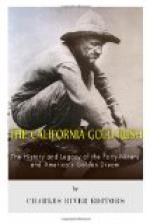But, the Californian’s undoubtedly admirable qualities of generosity, kindheartedness (whenever narrow prejudice or very lofty pride was not touched), hospitality, and all the rest, proved, in the eyes of a practical people confronted with a large and practical job, of little value in view of his predominantly negative qualities. A man with all the time in the world rarely gets on with a man who has no time at all. The newcomer had his house to put in order; and it was a very big house. The American wanted to get things done at once; the Californian could see no especial reason for doing them at all. Even when his short-lived enthusiasm happened to be aroused, it was for action tomorrow rather than today.
For all his amiable qualities, the mainspring of the Californian’s conduct was at bottom the impression he could make upon others. The magnificence of his apparel and his accoutrement indicated no feeling for luxury but rather a fondness for display. His pride and quick-tempered honor were rooted in a desire to stand well in the eyes of his equals, not in a desire to stand well with himself. In consequence he had not the builder’s fundamental instinct. He made no effort to supply himself with anything that did not satisfy this amiable desire. The contradictions of his conduct, therefore, become comprehensible. We begin to see why he wore silks and satins and why he neglected what to us are necessities. We see why he could display such admirable carriage in rough-riding and lassoing grizzlies, and yet seemed to possess such feeble military efficiency. We comprehend his generous hospitality coupled with his often narrow and suspicious cruelty. In fact, all the contrasts of his character and action begin to be clear. His displacement was natural when confronted by a people who, whatever their serious faults, had wants and desires that came from within, who possessed the instinct to create and to hold the things that would gratify those desires, and who, in the final analysis, began to care for other men’s opinions only after they had satisfied their own needs and desires.
CHAPTER II
THE AMERICAN OCCUPATION
From the earliest period Spain had discouraged foreign immigration into California. Her object was neither to attract settlers nor to develop the country, but to retain political control of it, and to make of it a possible asylum for her own people. Fifty years after the founding of the first mission at San Diego, California had only thirteen inhabitants of foreign birth. Most of these had become naturalized citizens, and so were in name Spanish. Of these but three were American!
Subsequent to 1822, however, the number of foreign residents rapidly increased. These people were mainly of substantial character, possessing a real interest in the country and an intention of permanent settlement. Most of them became naturalized, married Spanish women, acquired property, and became trusted citizens. In marked contrast to their neighbors, they invariably displayed the greatest energy and enterprise. They were generally liked by the natives, and such men as Hartnell, Richardson, David Spence, Nicholas Den, and many others, lived lives and left reputations to be envied.




